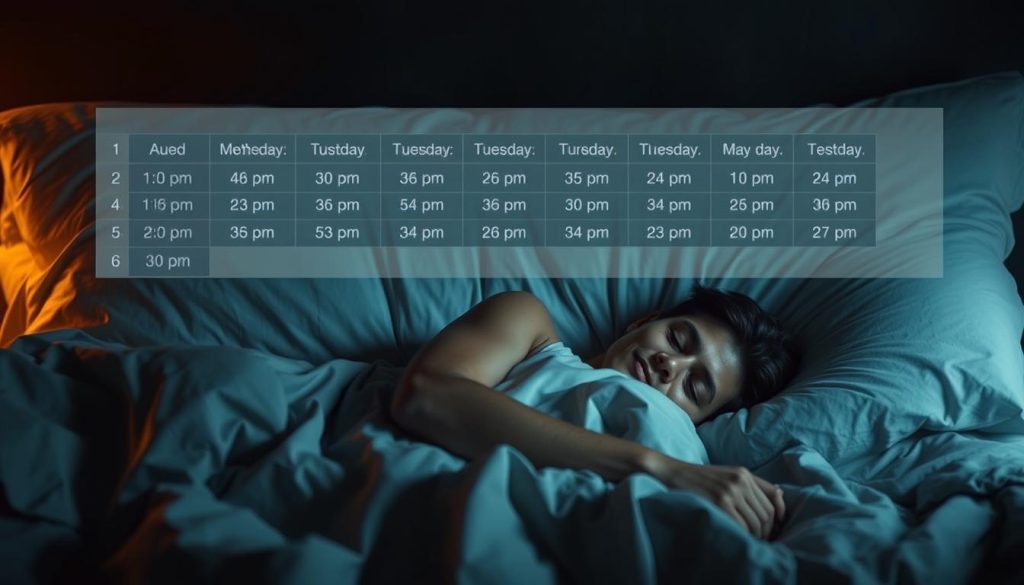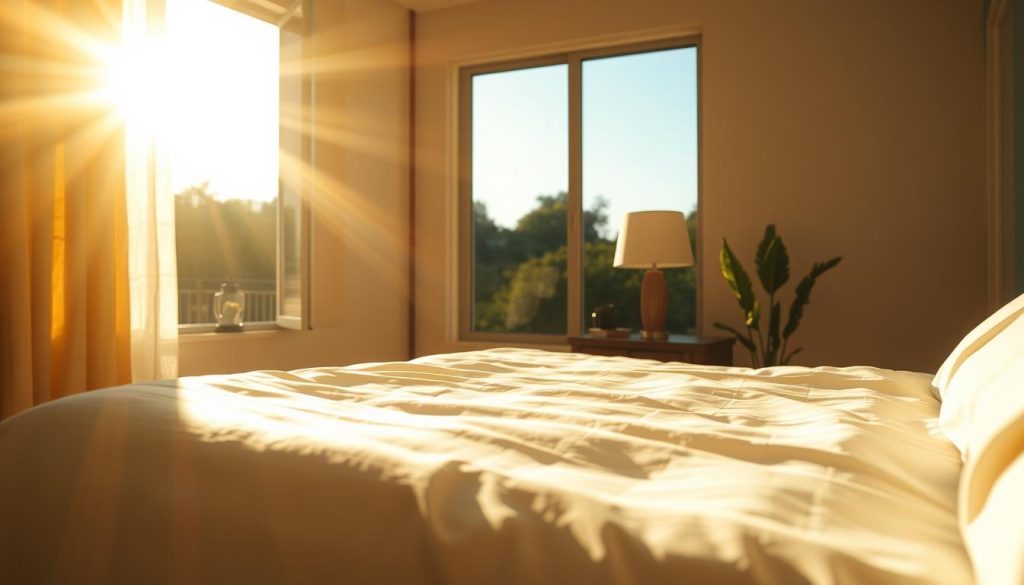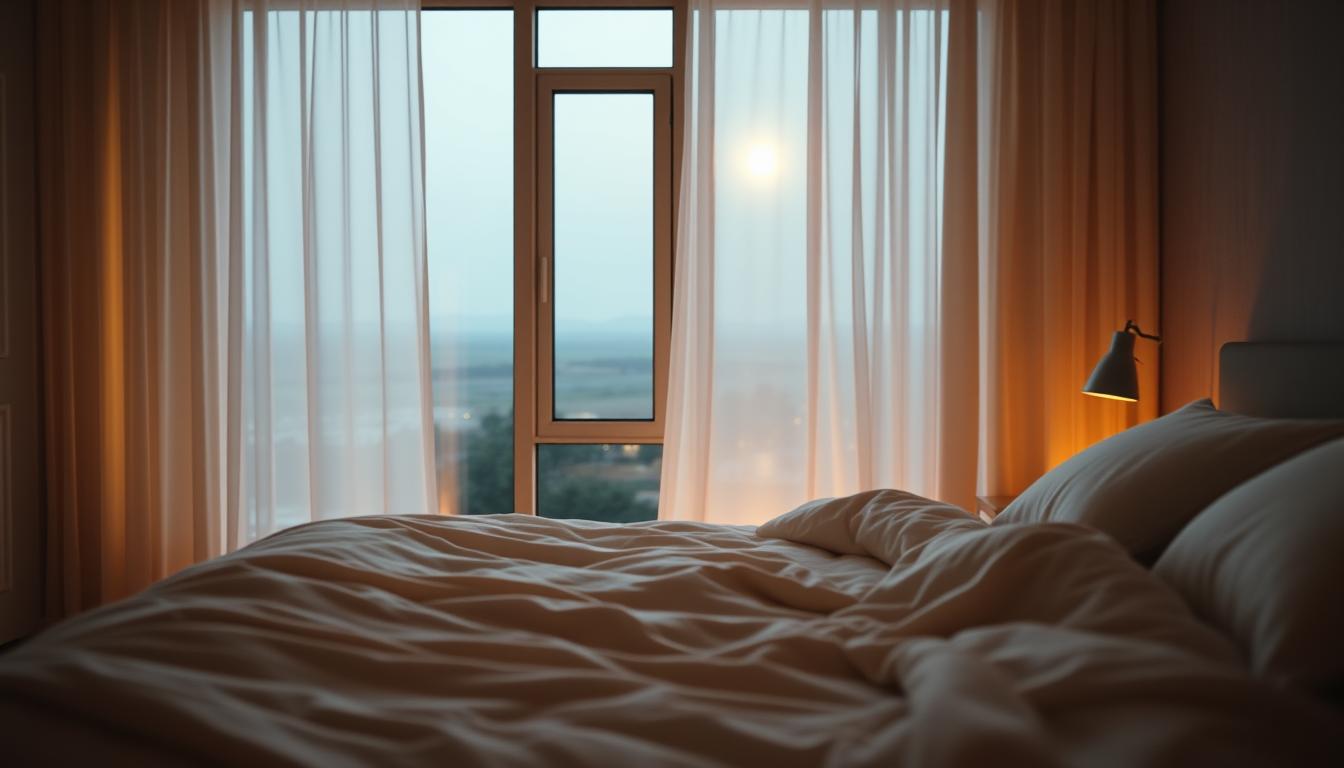Creating the best sleep schedule can change your life for the better. It helps you perform daily tasks more efficiently and improves your health over time. Getting enough sleep is key to feeling rested and ready to tackle the day.
By matching your sleep to your body’s natural rhythms, you boost your daily performance. You’ll enjoy better sleep quality and see a big jump in your productivity.
Learning how sleep affects your health is a big step towards better days. This guide will help you find a sleep schedule that fits you perfectly. It’s all about living your best life.
Understanding the Importance of Sleep
Exploring sleep science shows us how our bodies rest at night. It teaches us about circadian rhythms and sleep cycles. This knowledge helps us see how sleep affects our health and mind.
The Science Behind Sleep
Sleep science tells us how important circadian rhythms and sleep cycles are. These rhythms are shaped by light and our lifestyle. They decide how well we sleep.
Health Benefits of Quality Sleep
Good sleep does more than just make us feel refreshed. It’s key for a healthy heart, managing weight, and keeping our immune system strong. Studies show that quality sleep is essential for our health.
Impact on Mental Health
There’s a strong link between sleep and mental health. Getting enough sleep lowers the chance of depression, anxiety, and mood swings. The National Sleep Foundation’s research highlights sleep’s role in our mental well-being.
Identifying Your Personal Sleep Needs
Understanding your sleep needs is key to a good sleep routine. Your age, lifestyle, and genes all play a part. It’s important to look at each of these closely.

Factors Influencing Sleep Requirements
Many things can change how much sleep you need. Your age is a big one, with kids needing more than adults. Your work and how active you are also matter.
Genes can shape your natural sleep cycle. Knowing these factors helps you create a sleep plan that’s just right for you.
Calculating Your Optimal Sleep Duration
To figure out how much sleep you need, you can use sleep debt or talk to sleep experts. The CDC says adults should sleep 7-9 hours a night. But, everyone’s different.
Tracking your sleep and feeling how rested you are can help. This way, you can find the best sleep routine for you.
In short, knowing and meeting your sleep needs can really improve your life. It ensures you get the sleep you need every night.
Creating the Best Sleep Schedule
Having a good sleep timetable is key to a healthy life. It helps your body work better, improving your mind and body health.
Setting a Consistent Bedtime
Keeping a regular sleep routine is essential. Going to bed and waking up at the same time every day helps your body adjust. Try to get 7-9 hours of sleep each night, based on what you need.
Balancing Work and Sleep
It’s hard to balance work and sleep, especially with tough jobs and odd hours. Make time to relax before bed to help you sleep better. Stay away from work and caffeine at night. Use activities like reading or meditation to ease into sleep.
Using Sleep Apps and Trackers
Using sleep technology can really help your sleep. Sleep apps and trackers watch your sleep, giving you tips for better sleep. Devices like Fitbit or apps like Sleep Cycle can help you sleep better every night.
Morning Routines to Complement Your Sleep Schedule
Creating good morning routines is key to better sleep. The right habits can boost your health, starting with light and exercise in the morning.
The Role of Morning Light
Light plays a big role in our sleep patterns. Waking up to sunlight tells your body it’s time to be awake. This helps make serotonin, which turns into melatonin for sleep.
Studies, like those from the Sleep Foundation, show morning light’s benefits. It improves mood, alertness, and brain function.

Exercise and Its Benefits
Morning exercise can make your sleep better. It boosts energy and helps set your body’s clock. Health experts say it cuts down on insomnia and improves deep sleep.
Adding exercise to your mornings can lead to better sleep at night.
How to Establish Healthy Sleep Habits
Creating healthy sleep habits is key to a better night’s sleep. By cutting down on screen time and setting up your bedroom right, you can sleep better. This improves your overall sleep quality.
Limiting Screen Time
It’s important to reduce screen time before bed. Devices give off blue light that messes with melatonin, the sleep hormone. To sleep better, try to avoid screens for at least an hour before bed. Here are some tips:
- Set a nightly alarm to remind you to turn off devices.
- Do relaxing things like reading or meditation before bed.
- Use blue light filters on your devices in the evening.
Creating a Relaxing Bedroom Environment
Setting up your bedroom right can help you sleep better. Your bedroom should be calm and relaxing. Focus on these key points:
- Temperature: Keep your room cool, around 65 degrees Fahrenheit, for better sleep.
- Lighting: Use blackout curtains or an eye mask to block light.
- Noise Levels: Use white noise machines or earplugs to block out noise.
By following these tips, you can make your bedroom perfect for sleep.
The Ideal Bedtime Pattern for Different Age Groups
Setting the right bedtime is key for health at every life stage. Knowing the age-specific sleep schedules helps meet children’s sleep needs, adult’s sleep requirements, and senior sleep habits.
Children and Adolescents
Young ones need lots of sleep because their bodies and brains are growing fast. The National Sleep Foundation says kids aged 3-5 should sleep 10-13 hours. Kids aged 6-13 need 9-11 hours, and teens aged 14-17 should get 8-10 hours. Keeping bedtime and wake-up times the same is important for good sleep.

Adults
Adults have to balance sleep with work, family, and social life. Most adults need 7-9 hours of sleep to feel their best. Starting a calming pre-bed routine, like turning off screens, can help sleep quality. Knowing your sleep rhythm and sticking to it is crucial for a healthy life.
Seniors
As we get older, our sleep patterns change, often becoming lighter and shorter. Seniors still need 7-8 hours of sleep, but it can be hard due to health issues or meds. Creating a cozy sleep space, staying active, and having a regular bedtime routine can improve sleep and brain function.
Adapting Your Sleep Schedule for Shift Work
Shift workers face unique sleep challenges. They need careful planning and strategic adjustments. This is key to keep health and performance up during odd sleep hours.
Tackling Common Challenges
Managing irregular sleep cycles is a big challenge. Workers often find it hard to sleep consistently. This leads to sleep deprivation and messes up their circadian rhythm.
To tackle these shift work challenges, a stable sleep environment is vital. Use blackout curtains, earplugs, and keep your bedroom cool.
Optimizing Sleep on Unconventional Hours
For night or rotating shift workers, sleep optimization is personal. Napping before night shifts can reduce fatigue. Also, controlling light before and after work improves sleep quality.
Staying consistent with sleep patterns, even on days off, helps. It makes shift work sleep adaptation easier over time.
Diet and Its Impact on Your Sleep
Your diet greatly affects your sleep patterns. It’s key to know how diet impacts sleep to choose the right foods for a good night’s rest. Eating the right foods can improve your sleep quality and help you rest better.
Foods That Promote Better Sleep
Eating sleep-inducing foods can help you sleep better. Foods like cherries and almonds are good because they have melatonin. Foods high in magnesium, such as leafy greens and bananas, also help you relax and sleep well.
Adding these foods, especially at dinner, can make a big difference in how well you sleep.
Foods and Drinks to Avoid
Some foods can make it hard to sleep. It’s important to avoid caffeine and heavy meals before bed. Caffeine can stay in your system for a long time, making it hard to fall asleep.
Also, heavy or spicy meals can cause stomach problems, which can keep you awake. Being mindful of what you eat can greatly improve your sleep.
Recognizing and Overcoming Sleep Disorders
It’s key to know about sleep disorders for good health. Issues like insomnia, sleep apnea, and restless legs syndrome are common. Spotting these early lets people get the right help and beat sleep problems.
The American Sleep Association shares important info. They help us see how these issues affect our lives.
Common Sleep Disorders
Many sleep disorders exist. Here are a few:
- Insomnia – Trouble falling or staying asleep. It can be short-term or long-lasting and messes with daily life.
- Sleep Apnea – Pauses in breathing during sleep. This leads to broken sleep and heart problems.
- Restless Legs Syndrome (RLS) – Makes you feel like moving your legs because of weird feelings.
Treatment and Solutions
There are many ways to fix sleep issues. Some include:
- Cognitive Behavioral Therapy – Works well for insomnia. It changes thoughts and actions that mess with sleep.
- Continuous Positive Airway Pressure (CPAP) – A big help for sleep apnea. CPAP machines keep airways open at night.
- Lifestyle Adjustments – Exercise, eating right, and regular sleep times can also help.
Talking to doctors and using resources from places like the American Sleep Association can help. They offer plans that improve sleep and health.
The Role of Naps in an Optimal Sleep Routine
Adding short naps to your day can really boost your sleep routine. Napping can make you smarter and more energetic. It’s a great way to refresh yourself during the day.
Benefits of Napping
Napping has many advantages. It can improve your memory, make you more alert, and reduce tiredness. Even a short nap can make you more creative and productive. It’s good for students and workers alike.
How to Nap Effectively
To nap well, you need to do it right. Experts say naps should be 20 to 30 minutes long. It’s best to nap early in the afternoon. Also, make sure your nap spot is quiet and comfy.
Long-Term Benefits of a Proper Rest Schedule
Keeping a regular sleep schedule brings many health benefits. Studies show that regular sleep lowers the risk of heart disease, diabetes, and obesity. It also boosts physical and mental health, making life better overall.
Research shows that good sleep habits are key for brain health. They help prevent diseases like Alzheimer’s. This means your memory and thinking skills stay sharp as you age.
Good sleep also means living longer. Studies show that healthy sleepers live longer. Good sleep is more than just rest; it’s essential for long-term health and a long life.

